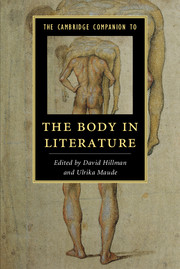Book contents
- The Cambridge Companion to The Body in Literature
- The Cambridge Companion to the Body in Literature
- The Body in Literature
- Copyright page
- Contents
- Notes on Contributors
- Book part
- 1 Introduction
- 2 Medieval Somatics
- 3 Disability
- 4 Staging Early Modern Embodiment
- 5 Eating, Obesity and Literature
- 6 Language and the Body
- 7 The Maternal Body
- 8 Literary Sexualities
- 9 The Body, Pain and Violence
- 10 The Ageing Body
- 11 Representing Dead and Dying Bodies
- 12 The Racialized Body
- 13 Literature, Technology and the Senses
- 14 Literature and Neurology
- 15 Psychoanalytic Bodies
- 16 Literature and Affect
- 17 Posthuman Bodies
- Index
- Cambridge Companions to…
- References
13 - Literature, Technology and the Senses
Published online by Cambridge University Press: 05 June 2015
- The Cambridge Companion to The Body in Literature
- The Cambridge Companion to the Body in Literature
- The Body in Literature
- Copyright page
- Contents
- Notes on Contributors
- Book part
- 1 Introduction
- 2 Medieval Somatics
- 3 Disability
- 4 Staging Early Modern Embodiment
- 5 Eating, Obesity and Literature
- 6 Language and the Body
- 7 The Maternal Body
- 8 Literary Sexualities
- 9 The Body, Pain and Violence
- 10 The Ageing Body
- 11 Representing Dead and Dying Bodies
- 12 The Racialized Body
- 13 Literature, Technology and the Senses
- 14 Literature and Neurology
- 15 Psychoanalytic Bodies
- 16 Literature and Affect
- 17 Posthuman Bodies
- Index
- Cambridge Companions to…
- References
- Type
- Chapter
- Information
- The Cambridge Companion to the Body in Literature , pp. 177 - 196Publisher: Cambridge University PressPrint publication year: 2015
References
Further Reading
- 4
- Cited by



